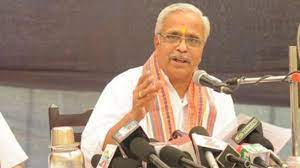NEW DELHI, Sept 16: The Rashtriya Swayamsevak Sangh (RSS) the ideological mentor of the ruling BJP, view the emergence of the Narendra Modi government at the centre in 2014 as the “beginning when India started coming out of the colonial era” but has expressed concern over the situation in Manipur asking the BJP governments in the state and the Centre to take decisions to contain the conflict between two communities.
“The situation in Manipur is worrisome but it’s the government that needs to take decisions as the conflict is between two communities, the RSS joint general secretary Manmohan Vaidya said on Saturday. Mr Vaidya was speaking to media persons on the culmination of the RSS’ three-day annual coordination meeting in Pune, which began on September 14.
He added that after 2014, India had begun slowly emerging in the world with its cultural identity. There have been major changes in the foreign, defence, and education policies, which the rest of the world is looking up to, he said. “It will take at least 25-30 more years to undo what all wrong has been done,” Mr Vaidya added.
“The situation in Manipur is tense and this is what our volunteers reported to us in the meeting. We are all doing our work but the government has to take decisions for the conflict that exists between the Kuki and Meitei [communities]. As part of the RSS’s work, our volunteers are in touch with both groups and service work is being done for both,” Mr Vaidya added.
Responding to a question on how the RSS evaluates the work of the BJP — one of the 36 affiliates of the Sangh — since 2014, Mr. Vaidya quoted a line from an opinion piece that appeared in an international newspaper in May 2014. “On 16 May, 2014, the Parliament results were declared. On May 18, an editorial appeared in The Guardian newspaper, whose first line was — ‘Today, 18 May, 2014, may well go down in history as the day when Britain finally left India.’ This speaks volumes,” Mr Vaidya said.
Speaking on the ‘India and Bharat’ naming controversy that erupted recently, Mr Vaidya said no country in the world had two names. “The name Bharat has civilisational value and this is why it should only be Bharat,” he asserted.
Commenting on the RSS’ stand on reservation, the senior functionary said the Scheduled Caste (SC)/Scheduled Tribe (ST) people in Indian had been deprived of respect, facilities, and education for decades. “To bring them into mainstream, whatever reservation is there as per the Constitution, should be given. Also, efforts should be made to overcome this social inequality,” Mr Vaidya said.
Elaborating on the main issues discussed at the meeting, Mr. Vaidya said 246 representatives from 36 different organisations had been present at the meeting. They had all agreed that the role of women is most prominent in the family, the smallest unit of any society.
“Women’s participation is increasing in the society, which is commendable. In this context, increasing participation of women under the Sangh’s centenary scheme was discussed in the meeting. To achieve the target of having more women’s participation, we have a target of holding 211 conferences across the country till 2025. So far, 73 such conferences have been organised in 12 provinces, which have received good response, with more than 1.23 lakh women participating,” Mr Vaidya said.
He also said that before COVID-19, till February 2020, 62,491 RSS shakhas (branches) were meeting at 38,913 locations. The Sangh held weekly meetings at 20,303 locations and monthly congregations at 8,732 places. After a gap in public interaction during the pandemic, in 2023, the number of shakhas increased to 68,651 and they were now running at 42,613 locations.
(Manas Dasgupta)

